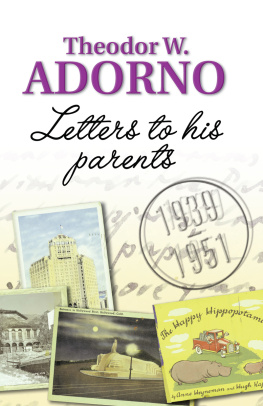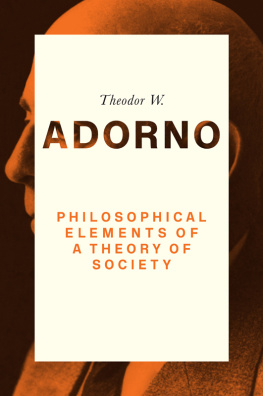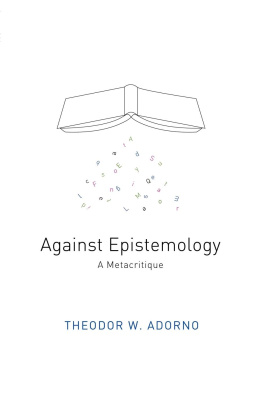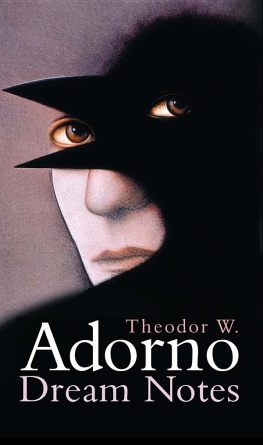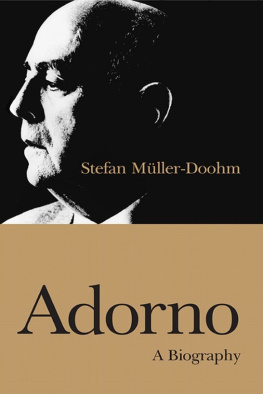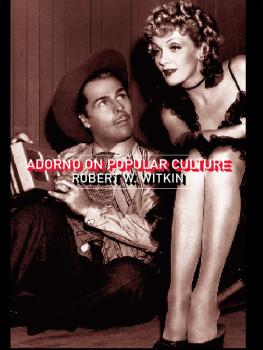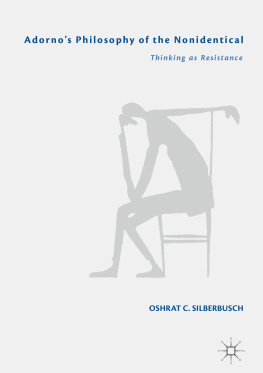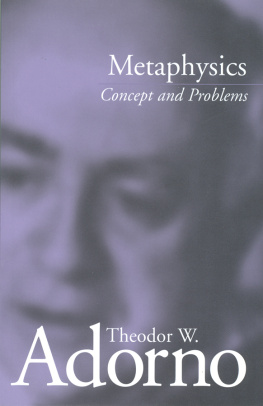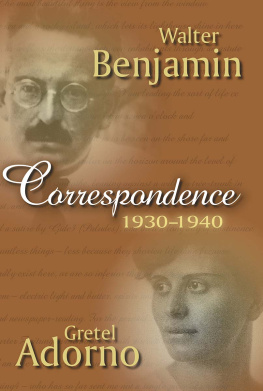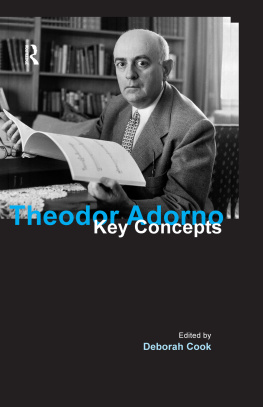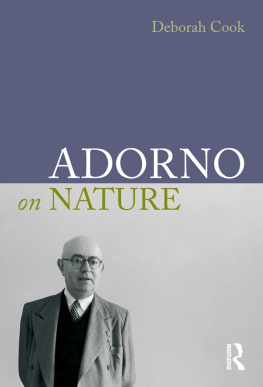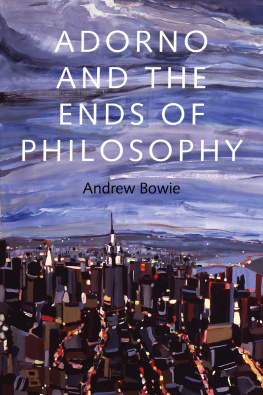Contents
Guide
Print Page Numbers
Letters to his Parents
First published in German as Theodor W. Adorno: Briefe an die Eltern 19391951 and copyright Suhrkamp Verlag, Frankfurt am Main, 2003.
This English translation Polity Press 2006
Polity Press
65 Bridge Street
Cambridge CB2 1UR, UK
Polity Press
350 Main Street
Malden, MA 02148, USA
All rights reserved. Except for the quotation of short passages for the purpose of criticism and review, no part of this publication may be reproduced, stored in a retrieval system, or transmitted, in any form or by any means, electronic, mechanical, photocopying, recording or otherwise, without the prior permission of the publisher.
ISBN-13: 978-07456-9502-0
A catalogue record for this book is available from the British Library.
For further information on Polity, visit our website: www.polity.co.uk
Contents
Editors Foreword
When Adorno saw his parents again in June 1939 in Havana, they had only been in Cuba for a few weeks. Oscar and Maria Wiesengrund had managed to escape from Nazi Germany at the last minute. At the end of 1939 they moved first to Florida, then to New York, where they lived from August 1940 until the end of their lives. It is only with his move to California at the end of 1941 that Adornos letters resume once more, coming almost consistently once every two weeks, reporting on work and living conditions as well as friends, acquaintances and the Hollywood stars of his time. One finds reports of his collaborations with Max Horkheimer, Thomas Mann and Hanns Eisler alongside accounts of parties, clowning around with Charlie Chaplin, and ill-fated love affairs. But the letters also show his constant longing for Europe: Adorno already began to think about his return as soon as the USA entered the war.
The Letters to his Parents surely the most open and direct ones he ever wrote not only afford the reader a glimpse of the experiences that gave rise to the famous Minima Moralia, but also show Adorno from a previously unknown, extremely personal side. They end with the first reports from the ravaged Frankfurt to his mother, who remained in New York and from Amorbach, his childhood paradise.
The occasional harsh comments about the family of his uncle Louis the brood can be attributed to a strong spleen on Adornos part, which was well known and indeed criticized in the Wiesengrund family, and which he only seems to have been able to control in the immediate presence of his relatives.
Unfortunately, of the equally numerous letters sent by his parents during their emigration in Cuba and America, only two from his father, from 1945 and 1946, were found among Adornos belongings; of his mothers letters, those written from March 1948 onwards have survived. Excerpts from these have been cited where it assists the reader in understanding Adornos letters.
The letters written by Theodor and Gretel Adorno are reproduced with diplomatic faithfulness; words written unclearly are marked with a question mark in square brackets. This also applies to any additions or alterations made by the editors.
The notes serve to explain events and names found in the letters. The editors have sought to supply information also about those friends and acquaintances, both from Frankfurt and then America, whose names never became well known. Unfortunately this was not always possible; in some cases the notes could not ultimately be as comprehensive as intended, or the editors were even forced to give up entirely.
The following collected editions are referred to in abbreviated form:
Theodor W. Adorno, Gesammelte Schriften, ed. Rolf Tiedemann in collaboration with Gretel Adorno, Susan Buck-Morss and Klaus Schultz, vols. 120 (Frankfurt am Main: Suhrkamp, 197086): GS [120].
Max Horkheimer, Gesammelte Schriften, ed. Alfred Schmidt and Gunzelin Schmid Noerr, vols. 119 (Frankfurt am Main: Fischer, 198896): Horkheimer, Gesammelte Schriften [119].
Max Horkheimer, Gesammelte Schriften, vol. 17: Briefwechsel 19411948, ed. Gunzelin Schmid Noerr (Frankfurt am Main: Fischer, 1995): Horkheimer, Briefwechsel 194148.
The editors would like to thank the following persons for assisting them in their research: Wolfram von Boxberg (Meckenheim), Volker Harms-Ziegler (Institut fr Stadtgeschichte, Frankfurt am Main), Joachim Heimannsberg (Munich), Rdiger Koschnitzki (Deutsches Filminstitut), Ingrid Kummels and Gundram Kunz (Amorbach), Fritz-Bernd Leopold (Deutsches Literaturarchiv, Marbach am Neckar), Michael Maaser (Universittsarchiv der Johann Wolfgang Goethe-Universitt, Frankfurt am Main), Susanne Neis (Stadtarchiv Neunkirchen), Frau Neugebauer (Amorbach), Reinhard Pabst (Bad Camberg), Elisabeth Reinhuber-Adorno (Oberursel), Klaus Rhein-furth (Institut fr Stadtgeschichte, Frankfurt am Main), Manfred Schfer (Amorbach), Joachim Seng (Hofmannsthal-Archiv, Freies Deutsches Hochstift, Frankfurt am Main) and Jochen Stollberg (Stadtund Universittsbibliothek, Frankfurt am Main).

Oscar and Maria Wiesengrund, c. 1939

Theodor W. Adorno, c. 1939
1939
NEW YORK, 12.5.1939
12 May 1939
My dears:
this is but a brief note to welcome you to the new world, where you are now no longer all too far away from us. Our anxiety will not cease until we know that you have arrived safely, and we are putting off everything else until the moment we receive your telegram. I only wish to add that it is my firm intention to visit you as soon as possible. I cannot name a date at present, as this depends not on my wishes, but partly on the radio project. But I shall not wait a day longer than absolutely necessary.
We received your letter from Antwerp, to our greatest joy, and are relieved to know that everything has gone smoothly so far. I hope with all my heart that you will now truly have a peaceful time, and that you will experience your emigration, now that it has become inevitable, somewhat in the manner of an extended Amorbach.
We will discuss the matter of how to get you over here as soon as I am with you.
Otherwise, I would only like to give you two pieces of advice today: 1.) do not eat any uncooked pork, as the risk of trichinosis is very high throughout America, 2.) take great care from the start to protect yourselves against the sun, which must be considerable now in Cuba, 3.) be very careful in your dealings with other emigrants. Frenkels business partner But I hope that the whole Cuban expedition will be no more than a brief transitional episode. I need hardly tell you how happy we shall both be when we know that you are nearby and have escaped the horror. Or rather: I hardly dare say so, out of superstition, until your telegram is brought here. Gretel and I are already envisioning how it will be when I tell you all the stories about the hippos, giraffes and hyenas that have meanwhile dissolved into a mirage in the American desert.

